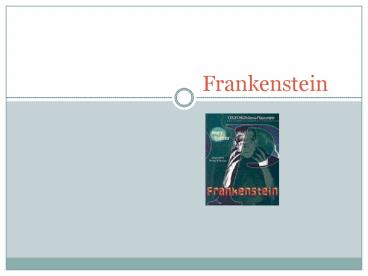Frankenstein - PowerPoint PPT Presentation
1 / 20
Title:
Frankenstein
Description:
Frankenstein Which Frankenstein are we studying? Frankenstein, the novel, by Mary Shelley. Frankenstein, the play, by Phillip Pullman. Frankoworm, the children s book. – PowerPoint PPT presentation
Number of Views:814
Avg rating:3.0/5.0
Title: Frankenstein
1
Frankenstein
2
Which Frankenstein are we studying?
- Frankenstein, the novel, by Mary Shelley.
- Frankenstein, the play, by Phillip
Pullman.Frankoworm, the childrens book.
3
The Source -
- Mary Shelley wrote the novel, Frankenstein in
1818. - Phillip Pullman adapted the novel into a play in
1990. - Both texts were written in different times and
different contexts.
4
Who is Mary Shelley?
- Born in 1797 to William Godwin and Mary
Wollstonecraft. - Her mother Mary Wollstonecraft was a writer but
died when Mary was very young. - She was an avid reader and scholar and knew
through her father some of the most important men
of the time (William Wordsworth and Samuel Taylor
Coleridge) - Married (scandal!) Percy Bysshe Shelley in 1816
and listened intently to his intellectual
conversations with others
5
Mary Shelley
- On a visit in Switzerland, with her husband, PBS,
to Lord Byron, she was challenged to write a
story. She had heard Byron and Shelley discussing
the nature of the principle of life and whether
there was any chance of its ever being
discovered. From this conversation, she had the
waking dream which eventually became the novel
Frankenstein.
6
CONTEXT- What is the social, historical and
cultural context in which Shelley was
writing Frankenstein?
- No text is written without a PURPOSE or a
CONTEXT! - Mary Shelley grew up in the Romantic era which
began in the late 1700s. - Her purpose of writing Frankenstein was to
challenge the beliefs of the Age of Enlightenment
which preceded the Romantic Age.
7
Age of Enlightenment 1650- 1790vs Romantics
1790- 1850
- The Romantics revolted against the Age of
Enlightenment around the 1790s and led to the
French Revolution. - The Age of Enlightenment was an elitist cultural
movement which believed in three things - Reason is the source of all knowledge.
- Scientific experimentation is the key to human
progress. - Intellectual inquiry without belief in religious
truth. - Isaac Newton, John Locke were the intellectuals
belonging to this Age.
8
The Romantics
- The Romantics asserted their belief in FREEDOM,
LIBERTY AND EQUALITY and rebelled against the
tyranny of the rich over the poor. - They rebelled against the supremacy of REASON and
returned to celebrate PASSION. - They revived a fascination and respect of NATURE
with a desire to IMAGINATIVELY TRANSFORM IT.
9
- Mary Shelleys Frankenstein deals with these
issues and tackles questions such as - What is the moral responsibility of man towards
nature as he investigates it scientifically? - Can we know everything through reason?
- What is the difference between human potential
and human limitation? What happens if we start to
play God?
10
Elements found in Frankenstein
- Science fiction
- Gothic elements
- Romantic fascination with nature and creation.
11
Major Characters-
- Victor Frankenstein is the protagonist.
- He is the product of an idealistic Enlightenment
education fueled by possibilities of science and
a desire for acclaim becomes obsessed with
creating life from spare body parts.
12
Major Characters
- The Creature - never named is Victors (alter
ego) Creature rationally analyzes the society
that rejects him sympathetic character, admires
people and wants to be a part of human society
only results in violence when he is repeatedly
rejected
13
Major Characters
- Henry Clerval Victors childhood friend true
romantic, wants to leave mark on the world, but
never loses sight of the moral relations of
things - Elizabeth adopted as an infant by Victors
family. - Robert Walton Arctic explorer whos obsessed
with gaining knowledge and fame rescues Victor
in the Arctic tells the story.
14
What is the difference between a play and
a novel?
- Use Inspiration to brainstorm some of the
elements of drama that are similar or different
to a novel.
15
Style Gothic Novel
- Frankenstein is generally categorized as a Gothic
novel, a genre of fiction that uses gloomy
settings and supernatural events to create and
atmosphere of mystery and terror. - Shelley adds to her development of the plot the
use of psychological realism, delving into the
psyches of the characters in and attempt to
explain why they react as they do and what drives
them to make their decisions.
16
Themes
- Consequences of irresponsibility in the pursuit
of knowledge - Consequences of pride
- Consequences of societys rejection of someone
who is unattractive - Destructive power of revenge
- Parent-child conflicts
- Sympathy
17
Other Literary Elements
- Irony 2 major ironies
- Creature is more sympathetic, more imaginative
and more responsible to fellow creatures - Creature has many pleasing qualities but is an
outcast because hes not physically attractive
18
Symbols
- White/light knowledge
- Water knowledge
- Ice danger
- Lightning natures power
- Nature acceptance, nuturing, calm
- Mountains sublime in nature
19
Antithesis-Contrasts of ideas, characters,
themes, settings or moods
- Masculine/feminine
- Beautiful/ugly
- Good/bad
- Light/dark
- Heat/cold
- Victor/creation
- Passion/reason
- Natural/unnatural
- Known/unknown
- Civilized/savage
20
Allusion
- Paradise Lost by John Milton story of mans
fall from innocence to painful knowledge Victor
can be compared to Adam, Satan, and Eve - The Rime of the Ancient Mariner by Samuel Taylor
Coleridge, like narrator, tells story as a
warning and a confession















![book❤️[READ]✔️ Frankenstein in Baghdad: A Novel PowerPoint PPT Presentation](https://s3.amazonaws.com/images.powershow.com/10130085.th0.jpg?_=20240912014)
![download⚡️[EBOOK]❤️ Frankenstein in Baghdad: A Novel PowerPoint PPT Presentation](https://s3.amazonaws.com/images.powershow.com/10130084.th0.jpg?_=20240912013)
![book❤️[READ]✔️ Frankenstein in Baghdad: A Novel PowerPoint PPT Presentation](https://s3.amazonaws.com/images.powershow.com/10129091.th0.jpg?_=20240911087)
![download⚡️[EBOOK]❤️ Frankenstein in Baghdad: A Novel PowerPoint PPT Presentation](https://s3.amazonaws.com/images.powershow.com/10129090.th0.jpg?_=20240911086)






![[PDF] Frankenstein: A Monstrous Parody Android PowerPoint PPT Presentation](https://s3.amazonaws.com/images.powershow.com/10091414.th0.jpg?_=20240803022)





